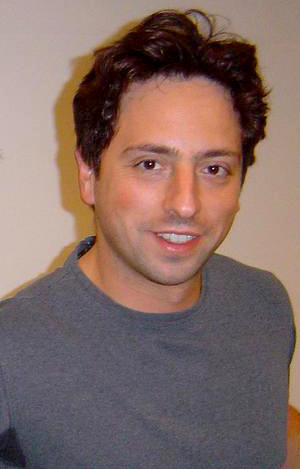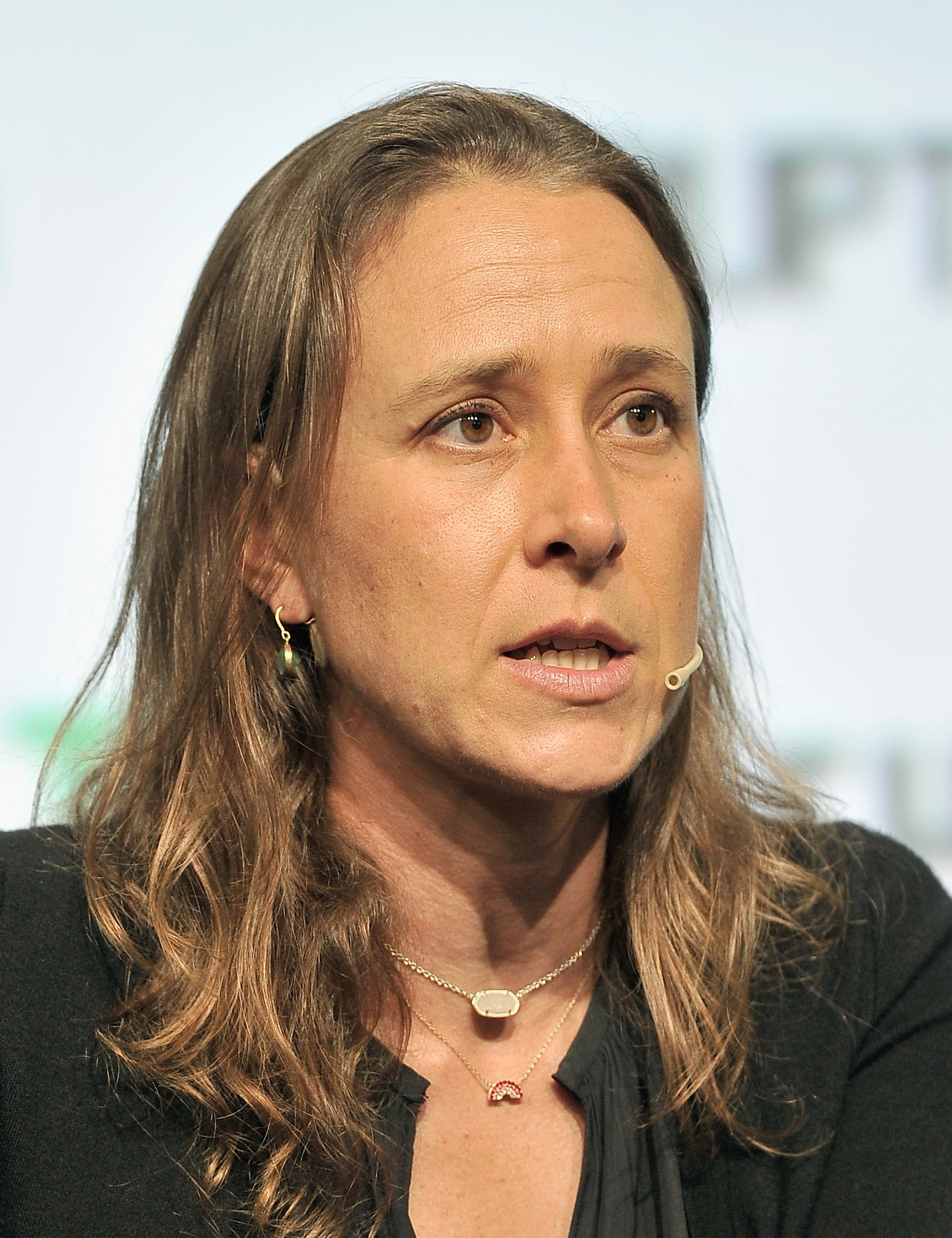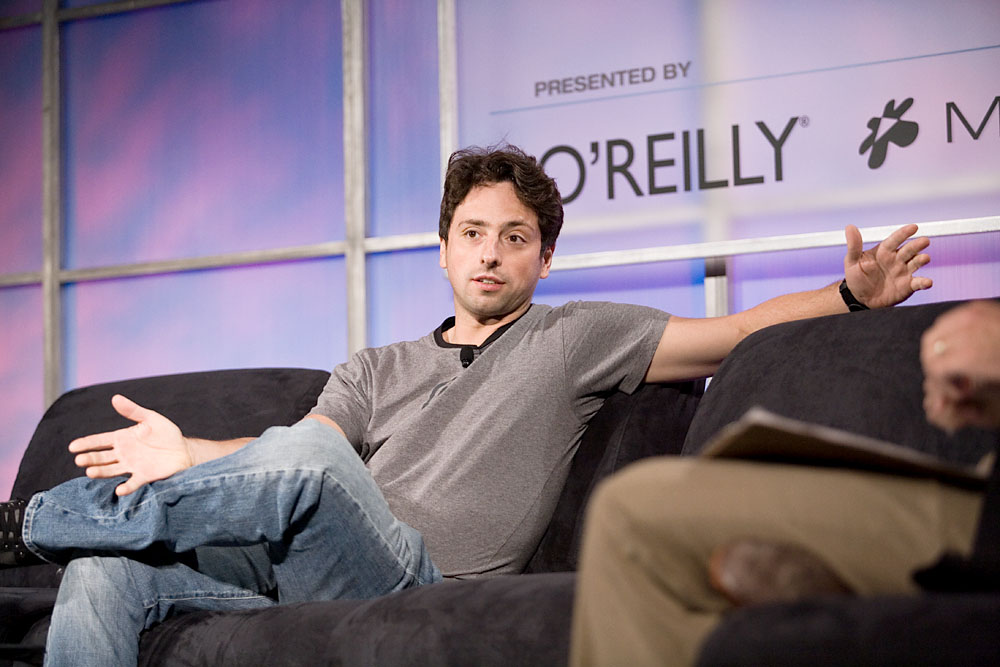1. Overview
Sergey Mikhailovich Brin (Сергей Михайлович БринSergey Mikhailovich BrinRussian), born on August 21, 1973, in Moscow, Soviet Union, is an American computer scientist and businessman best known as the co-founder of Google with Larry Page. His work has profoundly shaped the way the world accesses information, fundamentally transforming how knowledge is organized and disseminated. Brin served as the President of Google's parent company, Alphabet Inc., until stepping down on December 3, 2019, though he and Page remain influential as co-founders, controlling shareholders, and board members. His vision for universal information access has been compared to the historical impact of Johannes Gutenberg, who revolutionized printing. Brin's career reflects a deep engagement with the societal implications of technological advancements, from advocating for open information to addressing ethical considerations in technology development. As of December 2024, Brin is recognized as one of the wealthiest individuals globally, with an estimated net worth of 164.00 B USD.
2. Early life and background
Sergey Brin's early life was marked by his family's Jewish heritage and their emigration from the Soviet Union to the United States, driven by the desire for greater opportunities and freedom from antisemitism.
2.1. Birth and Family
Sergey Mikhailovich Brin was born on August 21, 1973, in Moscow, Soviet Union. His parents, Mikhail and Eugenia Brin, were both mathematicians who graduated from Moscow State University. His father later became a mathematics professor at the University of Maryland, and his mother worked as a researcher at NASA's Goddard Space Flight Center. The Brin family, including Sergey's paternal grandmother, lived in a three-room apartment in central Moscow.
2.2. Immigration and Upbringing
In 1977, after attending a mathematics conference in Warsaw, Poland, Sergey's father, Mikhail Brin, decided that the family should emigrate. They formally applied for an exit visa in September 1978, which resulted in his father being immediately fired from his job, and his mother also having to leave her position. For eight months, the family faced financial hardship, relying on temporary jobs while fearing their request would be denied, as was common for many refuseniks. In May 1979, their official exit visas were granted, allowing them to leave the country. The Brin family briefly resided in Vienna and Paris before Mikhail secured a teaching position at the University of Maryland with assistance from Anatole Katok. They received support from the Hebrew Immigrant Aid Society (HIAS) during this period, arriving in the United States on October 25, 1979. Despite their new life in the U.S., his family helped him maintain his Russian language skills.
2.3. Early Education
Brin attended elementary school at Paint Branch Montessori School in Adelphi, Maryland. He also received further education at home, where his father, a mathematics professor, actively encouraged his interest in mathematics. He later attended Eleanor Roosevelt High School in Maryland.
3. Education
Brin's academic career laid the groundwork for his future contributions to computer science and the internet.
3.1. University of Maryland
In September 1990, Brin enrolled at the University of Maryland, College Park. He pursued a Bachelor of Science degree in Computer Science and Mathematics, graduating with honors in 1993 at the age of 19. During 1993, he also completed an internship at Wolfram Research, the developers of Mathematica.
3.2. Stanford University
Following his undergraduate studies, Brin began his graduate work in computer science at Stanford University in September 1993, supported by a National Science Foundation graduate fellowship. He earned his Master of Science degree in computer science in 1995. As of 2008, he was on leave from his PhD studies at Stanford, having interrupted them to focus on Google. In 2003, Brin, along with Larry Page, was awarded an honorary MBA from IE Business School in Spain, recognizing their entrepreneurial spirit and contributions to new business creation.

4. Google Co-founding
The genesis of Google was a collaborative effort between Brin and Larry Page, transforming academic research into a global phenomenon.
4.1. Meeting Larry Page
Brin first met Larry Page during an orientation for new students at Stanford University in 1995. Initially, the two had differing viewpoints and seemed to disagree on most subjects. However, after spending more time together, they discovered a shared intellectual interest in finding and extracting relevant information from large datasets, eventually becoming "intellectual soul-mates and close friends."
4.2. Search Engine Development
Brin's academic focus was on developing data mining systems, while Page was interested in extending the concept of inferring the importance of a research paper from its citations in other papers. Their combined interests led them to co-author a seminal paper titled "The Anatomy of a Large-Scale Hypertextual Web Search Engine." To measure the importance of web pages, Brin and Page developed the PageRank algorithm, which analyzed the relevance of backlinks connecting one web page to another. This algorithm, named after Page, determined a page's rank based on the number and quality of its incoming links, leading them to realize they could build a search engine far superior to existing ones.

They began their work in Page's dormitory room, which they converted into a machine laboratory, using spare parts from inexpensive computers to connect their nascent search engine to Stanford's broadband campus network. As their project grew, they transformed Brin's dorm room into an office and programming center for testing new search engine designs. The rapid expansion of their project eventually caused issues for Stanford's computing infrastructure.
Page and Brin, utilizing Page's basic HTML programming skills, created a simple search page for users, as they lacked a dedicated web page developer for elaborate visual designs. They scavenged computer parts to assemble the necessary computing power to handle queries from multiple users. As their search engine gained popularity among Stanford users, it demanded additional servers to process the increasing number of queries. In August 1996, the initial version of Google, then known as BackRub, was made available on the Stanford Web site. By August 29, 1996, BackRub had indexed 75.23 million HTML URLs and downloaded 207.022 GB of content. It was written in Java and Python and ran on Sun Ultra series and Intel Pentium machines running Linux.
BackRub already possessed the fundamental characteristics of a search engine: it accepted a query and provided a list of backlinks ranked by importance. Page noted that by mid-1998, they realized the full potential of their project when they reached 10,000 searches a day, leading them to believe "maybe this is really real."
4.3. Founding Google
With the success of their search engine, Brin and Page decided to leave academia. They discontinued their PhD studies at Stanford to officially establish Google in 1998, initially operating from a garage owned by Susan Wojcicki in Menlo Park.
5. Role in Google and Alphabet
Brin has held pivotal leadership roles in the companies he co-founded, guiding their technological trajectory and maintaining significant influence.
5.1. President of Technology
Sergey Brin served as the President of Technology at Google, a role in which he guided the company's technological vision and oversaw its development initiatives. His leadership was crucial in shaping Google's innovative approach to information technology.
5.2. Activities at Alphabet
On December 3, 2019, Brin stepped down from his role as President of Alphabet Inc., concurrently with Larry Page's departure as CEO. Despite stepping down from their executive positions, Brin and Page remain actively involved in Alphabet as co-founders, controlling shareholders, and members of the board of directors.
6. Other interests and investments
Beyond his core responsibilities at Google and Alphabet, Brin has pursued various personal interests and made significant investments in emerging technologies.
6.1. Space Exploration and Aviation
In June 2008, Brin invested 4.50 M USD in Space Adventures, a Virginia-based space tourism company, expressing his interest in space exploration. Brin and Larry Page jointly own a customized Boeing 767-200 and a Dassault/Dornier Alpha Jet. They pay 1.30 M USD annually to house these aircraft, along with two Gulfstream V jets owned by Google executives, at Moffett Federal Airfield. The Boeing 767 is equipped with scientific instruments installed by NASA, allowing for the collection of experimental data during flights.
6.2. New Technology Investments
Brin is a notable backer of LTA Research & Exploration LLC, a company specializing in airship manufacturing. In October 2023, LTA's flagship airship, Pathfinder 1, measuring 407 ft (124 m) in length, received clearance for flight testing. This marked it as the largest airship since the Hindenburg to be cleared for such tests, permitted to fly up to 1509 ft (460 m) over the airspaces of Moffett Field and the neighboring Palo Alto Airport. Brin has also invested in Tesla Motors, a company known for developing electric vehicles, including the Tesla Roadster.
7. Personal life
Brin's personal life has included marriages, the raising of children, and subsequent divorces, alongside his non-religious upbringing.
7.1. Marriage and Children
Brin was raised Jewish but identifies as non-religious. In May 2007, he married biotechnology analyst and entrepreneur Anne Wojcicki in the Bahamas. They had a son in late 2008 and a daughter in late 2011. On November 7, 2018, Brin married Nicole Shanahan, a legal tech founder, and they had a daughter in late 2018.

7.2. Divorce
In August 2013, it was publicly announced that Brin and Wojcicki were living separately, following reports of Brin having an extramarital affair with a Google Glass colleague. Their divorce was finalized in June 2015. Brin and Shanahan separated on December 15, 2021, and Brin filed for divorce on January 4, 2022. Their divorce was finalized in the summer of 2023. The Wall Street Journal reported that a "brief affair" in 2021 between Shanahan and Elon Musk was a factor in their separation.
9. Wealth and reputation
Sergey Brin is consistently ranked among the world's wealthiest individuals, and his influence extends far beyond his financial standing into the realms of technology and global business.
9.1. Net Worth and Wealth Rankings
As of December 2024, Sergey Brin's estimated net worth is 164.00 B USD, making him the 7th richest person in the world, according to the Bloomberg Billionaires Index and Forbes. His wealth saw a significant increase, particularly after the COVID-19 pandemic, with Google's parent company, Alphabet Inc., reporting improved performance due to increased access to YouTube and Google Search. In the first four months of 2021 alone, his wealth grew by 20.40 B USD. Earlier estimates placed his net worth at approximately 18.70 B USD in March 2008 (ranking 32nd globally), and 50.60 B USD in October 2018 (ranking 13th).
9.2. Evaluation as an Influential Figure
Brin is widely recognized as a significant and influential figure in the technology and business sectors. In 2004, he and Larry Page were named "Man of the Week" by ABC World News Tonight. In January 2005, he was nominated as one of the "Young Global Leaders" at the World Economic Forum. In 2007, PC World magazine ranked Brin, along with Larry Page and Eric Schmidt, as the number one most important person among the 50 most important individuals in the web world.

10. Awards and accolades
Sergey Brin has received numerous honors and recognitions throughout his career for his groundbreaking contributions to technology and business.

- In 2002, Brin, alongside Larry Page, was named in the MIT Technology Review TR100 list, recognizing him as one of the top 100 innovators in the world under the age of 35.
- In 2003, both Brin and Page were awarded an honorary MBA from IE Business School for "embodying the entrepreneurial spirit and lending momentum to the creation of new businesses." The same year, they were also Award Recipients and National Finalists for the EY Entrepreneur of the Year Award.
- In 2004, Brin and Page received the Marconi Prize and were elected Fellows of the Marconi Foundation. They were cited "for the invention that has fundamentally changed the way information is retrieved today." Also in 2004, Brin received the American Academy of Achievement's Golden Plate Award with Larry Page at a ceremony in Chicago, Illinois.
- In 2006, Brin was part of the inaugural class of winners of the Great Immigrants Award named by Carnegie Corporation of New York.
- In February 2009, Brin was inducted into the National Academy of Engineering, one of the highest professional distinctions for an engineer, specifically "for leadership in development of rapid indexing and retrieval of relevant information from the World Wide Web."
- In November 2009, Forbes magazine named Brin and Page the fifth most powerful people in the world.
- The National Science Foundation's "Profiles" of Fellows highlighted several earlier awards for Brin, noting his appearances as a featured speaker at the World Economic Forum and the Technology, Entertainment and Design Conference (TED). PC Magazine praised Google in its "Top 100 Web Sites and Search Engines" (1998) and awarded Google the "Technical Excellence Award for Innovation in Web Application Development" in 1999. In 2000, Google received a Webby Award and a People's Voice Award for technical achievement. In 2001, Google was recognized with multiple Search Engine Watch Awards, including Outstanding Search Service, Best Image Search Engine, Best Design, Most Webmaster Friendly Search Engine, and Best Search Feature.
11. Legacy and evaluation
Sergey Brin's lasting impact on the internet, information technology, and society is profound. His co-founding of Google revolutionized how individuals access and interact with information, making vast amounts of knowledge universally available. This transformation has led to comparisons between Brin and historical figures like Johannes Gutenberg, the inventor of the modern printing press. Authors of The Google Story noted that "Not since Gutenberg... has any new invention empowered individuals, and transformed access to information, as profoundly as Google."
Beyond the web, Brin and Page envisioned expanding their information organization efforts to include digitizing books and enhancing access to health information, demonstrating a broader commitment to universal knowledge. His work, alongside Google's mission to "organize the world's information and make it universally accessible and useful," underscores a legacy centered on the democratization of information. Brin's philanthropic endeavors, particularly his substantial contributions to Parkinson's disease research, also highlight his commitment to leveraging his success for social good and addressing critical health challenges.